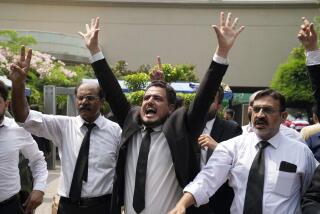Former president of Maldives seeks refuge at Indian embassy
- Share via
Days after his arrest was ordered, the former president of the Maldives sought refuge Wednesday at the Indian embassy, the latest twist in a political saga that has gripped the chain of islands south of India.
Mohamed Nasheed stepped down as president last year after weeks of turmoil, set off by his decision last February to arrest a judge whose rulings he claimed were politically tainted.
He and his backers later said he was forced to resign by forces loyal to his country’s longtime autocracy, which held sway over the Maldives until its first democratic elections roughly four and a half years ago. In August, a national commission countered that there was no coup and concluded that Nasheed had run afoul of the constitution by arresting the judge, findings that triggered new rounds of protests.
The debate over what happened last February – and whether Nasheed should face charges for ordering the judge arrested – has continued to roil the Maldives since.
Maldivian Democratic Party spokesman Hamid Abdul Ghafoor argued the court case against Nasheed is “a thinly veiled attempt” by the new president, Mohamed Waheed, to keep the former leader from campaigning for reelection in September. President Waheed has denied any meddling in the courts.
A court ordered that Nasheed be arrested this week after failing to appear in court; his supporters say Nasheed was in India and unable to return because of “a medical emergency.” The former president then turned to the Indian embassy in the Maldivian city of Male.
“Mindful of my own security and stability in the Indian Ocean, I have taken refuge at the Indian High Commission in Maldives,” Nasheed wrote on Twitter on Wednesday.
The Indian government said it was in touch with Maldivian authorities to resolve the crisis. In an apparent allusion to the claims raised by Nasheed and his supporters, it urged the Maldives to ensure that candidates are “free to participate in the elections without any hindrance.”
“Prevention of participation by political leaders in the contest would call into question the integrity of the electoral process, thereby perpetuating the current political instability in Maldives,” India said in a government statement Wednesday. “This is not in the interest of Maldives or the region.”
The Maldives foreign affairs ministry said Wednesday that it would respect the immunities granted to the embassy -- which prevent police from arresting Nasheed there -- and was confident that India would respect the independence of its courts.
The island nation should be aware of other countries trying “to interfere in our internal affairs,” Home Affairs Minister Mohamed Jameel Ahmed tweeted, adding that “when the tyrannical rule of Nasheed oppressed the people … BIG democracies were silent.”
President Waheed had not issued an official statement on the situation as of late Wednesday in the Maldives. As of that time, Nasheed had not emerged from the embassy, according to local media.
ALSO:
10 Afghan civilians reported killed in NATO airstrike
India bribery scandal threatens to ground $750-million copter deal
Pope Benedict hailed by crowds, may be papal advisor in retirement
More to Read
Sign up for Essential California
The most important California stories and recommendations in your inbox every morning.
You may occasionally receive promotional content from the Los Angeles Times.












